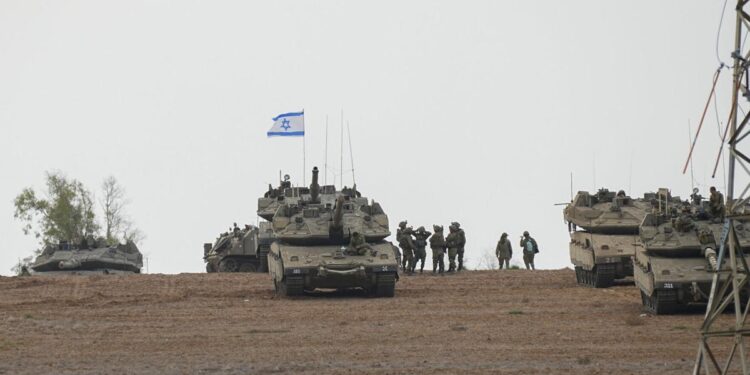Last Saturday, while Jews around the world celebrated Simchat Torah, the Jewish Festival commemorating the end of the yearly cycle of reading the Torah, Palestinian militants led by Hamas staged a massive surprise attack on Israel from their enclave in Gaza. Hamas fired more than 2,000 rockets at Israeli settlements and bases, while hundreds of fighters swarmed into Israel by air, sea, and land. They breached the barrier separating Gaza and Israel with bulldozers, trucks, and explosives, and used motorized gliders, drones, motorcycles, jeeps, cars, and boats to carry armed men into at least 22 Israeli towns where they slaughtered civilians, raided homes, and took hostages in a rampaging wave of violence that caught the Israeli Defense Force (IDF) completely off guard.
Video clips of the attacks showed residents being dragged into cars by gunmen, and Israelis accustomed to unquestioned military dominance were shaken to the core. At least 800 Israelis are dead, more than 2,400 are wounded, and at least a hundred are presumed held hostage in Gaza. It is the worst outbreak of violence in the region in many years and may herald the beginning of a prolonged war that will have implications for the entire world.
The Israeli response has been predictably massive. Prime Minister Benjamin Netanyahu told his people they are at war, called up more than 100,000 reservists, offered to form a unity government with the opposition party, and launched air strikes and ground attacks meant to clear Israeli settlements of Hamas fighters and destroy their facilities in Gaza. More than a thousand targets have already been hit, with at least 600 Palestinians killed and more than 2,900 wounded. Those numbers will inevitably go much higher.
For context, Gaza and the West Bank are Palestinian territories under the jurisdiction of the Palestinian Authority and adjacent to Israel. Both have been occupied by Israel since 1967, and Gaza is currently ruled by Hamas, a militant, fundamentalist, Islamic organization supported by Iran and others that came to power through an election in 2006. Hamas struggles to govern Gaza, which includes only 141 square miles of territory and yet boasts a population of more than 2.3 million. Israel blockaded the 37-mile border with Gaza after the 2006 elections because of the ties between Hamas and terrorist groups, and so Gaza has become an open-air prison of sorts. Unemployment, poverty, and shortages of water, electricity, food, and medical supplies are routine. Whether those conditions are the responsibility of Hamas or Israel is hotly debated, but poverty and hopelessness are key ingredients in recruiting terrorists, and Hamas has had no trouble in finding people to attack Israel as a result.
In the past, however, attacks were generally localized, and in recent years had declined in number and severity. Some observers concluded both sides had an interest in restraint — the Israelis because they had no interest in a major war inside Gaza and wanted to improve relations with Arab countries that supported the Palestinians — and Hamas because it recognized Israeli military superiority, understood the need of 20,000 day laborers from Gaza to be able to cross into Israel to work, and wanted more international support for economic development.
Those assumptions are now shattered. Israelis are humiliated by the greatest intelligence failure in their history, by the loss of towns and territory for the first time since the 1947-49 Arab Israeli War, and by the loss of so many lives and hostages. Retribution will be severe, and it will come largely at the expense of Palestinian civilians in Gaza, who may see door-to-door street fighting and a major Israeli invasion before the war ends.
Globally, most nations have rallied around Israel, but the long-term implications of the conflict are unclear and almost endless. If Iran pushed Hamas to attack then tensions between Israel and Iran will escalate, and the Iranians might then encourage attacks on Israel by Hezbollah, another militant group that hates Israel and is based in Lebanon.
The pending normalization of relations between Saudi Arabia and Israel, a deal long sought by the United States and deeply feared by Iran, is likely off the table. Military assistance to Israel from the United States will increase, and if Israelis need equipment that was slated for Ukraine, then the Ukrainians may receive less, creating an opportunity for the Russians to prolong, stabilize, or even win their barbaric war of conquest in eastern Europe.
Politically, Netanyahu has the support of most Israelis for now, but he spent the last nine months in a deeply divisive and socially destructive drive to overhaul Israel’s constitution and make it less democratic, and eventually those tensions will return and be enhanced by a growing sense that incompetence in his administration is to blame for the Israeli failure to anticipate Saturday’s attack. Israel maintains a massive intelligence service and oversees every level of life in Gaza and the West Bank. Israel controls all telephone and internet networks, infiltrates terrorist groups and pays informants, destroys infrastructure, assassinates terrorist leaders, spies on all communications, launches raids and air strikes when needed, and recently built a 65-kilometer technology wall comprised of radar, sensors, and cameras on the Gaza border. Yet those systems were unable to foresee Saturday’s assault, and eventually someone will be scapegoated for the debacle.
The war has immediate implications for the United States, which is moving an aircraft carrier strike group into the eastern Mediterranean and has announced nine Americans among the dead so far. Debates over American responsibility and our ability to support Israel and Ukraine simultaneously have quickly emerged, with former Vice President Mike Pence blaming Donald Trump, Ron DeSantis, and Vivek Ramaswamy for the disaster, arguing that promoting an American withdrawal from the world invites the enemies of freedom to act more boldly. Texas Republican Michael McCaul echoed those concerns, blaming fellow Republicans for their dysfunctional dismissal of Speaker of the House Kevin McCarthy because it signaled to the world that we are incapable of governing and therefore invited aggression.
The most devastating consequences, however, will be reserved for Hamas and the people of Gaza. Saturday’s attack guarantees that thousands of them will be killed, and while Hamas is claiming victory now it is probable that historians will look back on Oct. 7, 2023, as the date that leaders of Hamas condemned their people to more death and destruction than they could imagine.
Lance Janda holds a PhD in History from the University of Oklahoma and has more than 30 years of experience in higher education. He is the author of “Stronger Than Custom: West Point and the Admission of Women”, among other works.
Want to reach a local audience and grow your business?
Our website is the perfect platform to connect with engaged readers in your local area.
Whether you're looking for banner ads, sponsored content, or custom promotions, we can tailor a package to meet your needs.
Contact us today to learn more about advertising opportunities!
CONTACT US NOW




